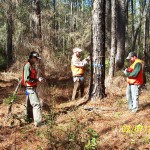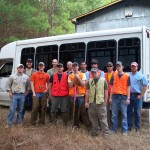For generations of forestry students dendrology has been an important rite of passage, and an important first subject. Every forester needs to know what kind of trees are in the forest! Dendrology is the science of identifying the species of tree based on leaves, bark, form, fruit, and flowers. It is a branch of systematic biology. Typically, students are expected to learn a hundred or so species of trees and shrubs with both common names and Latin or scientific names.
In most forest technology programs dendrology is taught largely in outdoor field labs, with a limited number of indoor class sessions. Recently, Brad Jones, of Itasca Community College, posed the question to CEFTS member instructors. How many students are allowed in each lab section. Here is a summary of his results.
| College | Location | Lab Size Cap |
| UofM | St. Paul, MN | 25 |
| SUNY – ESF Ranger School | Wanakena, NY | 16 |
| Dabney/Lancaster | Clifton Forge, VA | 12 |
| Hory-Georgetown Tech | Georgetown, SC | 14 |
| UNH-Thompson School | Durham, NH | 14 |
| Allegany College of Maryland | Cumberland MD | 12 |
| Penn State | Mont Alto, PA | 15 |
| Glenville State College | Glenville, MV | 25 |
| Morrisville State College | Morrisville, NY | 20 |
| Wayne Community College | Goldsboro, NC | -no cap- |
Many of the respondents said that lab size was limited by the size of the van. For many, size was limited by the need to maintain good communication between the instructor and the students. Too big a lab makes this difficult. Efficiency is another consideration, too. Larger labs means that more students can be accommodated in few class sections.
Whatever the size, it is certain that dendrology will remain an important part of the curriculum.


